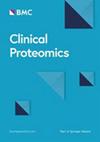原发性和复发性金刚瘤性颅咽管瘤的蛋白质组学研究
IF 3.3
3区 医学
Q2 BIOCHEMICAL RESEARCH METHODS
引用次数: 0
摘要
金刚瘤性颅咽管瘤(ACP)是一种罕见的良性上皮肿瘤,复发率高且预后不良。复发性颅咽管瘤和原发性颅咽管瘤之间可能与疾病复发和治疗有关的生物学差异尚未在蛋白质组水平上进行评估。在这项研究中,我们旨在确定配对复发性和原发性 ACP 的蛋白质组图谱,深入了解 ACP 复发的生物学特性,并确定 ACP 治疗的潜在靶点。本研究招募了在首都医科大学三博脑科医院接受手术并经病理证实为ACP或RCC的ACP(15例)或RCC(7例)患者。我们进行了蛋白质组学分析,以研究原发性 ACP、配对复发性 ACP 和 RCC 的特征。我们用 Western 印迹法验证了蛋白质组学结果,并评估了复发性 ACP 和原发性 ACP 中关键肿瘤相关蛋白的表达情况。流式细胞术评估了原发性和复发性ACP组织样本中肿瘤浸润淋巴细胞(TIL)的衰竭情况。对CD3和PD-L1进行免疫组化染色,以确定配对的原发性和复发性ACP样本中T细胞浸润和免疫抑制分子表达的差异。生物信息学分析表明,复发性 ACP 与原发性 ACP 之间表达不同的蛋白质与细胞外基质组织和白细胞介素信号传导密切相关。与原发性 ACP 相比,Cathepsin K 在复发性 ACP 中上调,它可能在 ACP 复发中发挥作用。ACP 的流式细胞术分析显示了 T 细胞的高度浸润和 TIL 的耗竭。本研究初步描述了原发性 ACP、复发性 ACP 和 RCC 之间的蛋白质组差异。我们的研究结果可作为颅咽管瘤研究人员的参考资料,最终可能会扩展现有的复发性 ACP 知识并有益于临床实践。本文章由计算机程序翻译,如有差异,请以英文原文为准。
Proteomics study of primary and recurrent adamantinomatous craniopharyngiomas
Adamantinomatous craniopharyngiomas (ACPs) are rare benign epithelial tumours with high recurrence and poor prognosis. Biological differences between recurrent and primary ACPs that may be associated with disease recurrence and treatment have yet to be evaluated at the proteomic level. In this study, we aimed to determine the proteomic profiles of paired recurrent and primary ACP, gain biological insight into ACP recurrence, and identify potential targets for ACP treatment. Patients with ACP (n = 15) or Rathke’s cleft cyst (RCC; n = 7) who underwent surgery at Sanbo Brain Hospital, Capital Medical University, Beijing, China and received pathological confirmation of ACP or RCC were enrolled in this study. We conducted a proteomic analysis to investigate the characteristics of primary ACP, paired recurrent ACP, and RCC. Western blotting was used to validate our proteomic results and assess the expression of key tumour-associated proteins in recurrent and primary ACPs. Flow cytometry was performed to evaluate the exhaustion of tumour-infiltrating lymphocytes (TILs) in primary and recurrent ACP tissue samples. Immunohistochemical staining for CD3 and PD-L1 was conducted to determine differences in T-cell infiltration and the expression of immunosuppressive molecules between paired primary and recurrent ACP samples. The bioinformatics analysis showed that proteins differentially expressed between recurrent and primary ACPs were significantly associated with extracellular matrix organisation and interleukin signalling. Cathepsin K, which was upregulated in recurrent ACP compared with that in primary ACP, may play a role in ACP recurrence. High infiltration of T cells and exhaustion of TILs were revealed by the flow cytometry analysis of ACP. This study provides a preliminary description of the proteomic differences between primary ACP, recurrent ACP, and RCC. Our findings serve as a resource for craniopharyngioma researchers and may ultimately expand existing knowledge of recurrent ACP and benefit clinical practice.
求助全文
通过发布文献求助,成功后即可免费获取论文全文。
去求助
来源期刊

Clinical proteomics
BIOCHEMICAL RESEARCH METHODS-
CiteScore
5.80
自引率
2.60%
发文量
37
审稿时长
17 weeks
期刊介绍:
Clinical Proteomics encompasses all aspects of translational proteomics. Special emphasis will be placed on the application of proteomic technology to all aspects of clinical research and molecular medicine. The journal is committed to rapid scientific review and timely publication of submitted manuscripts.
 求助内容:
求助内容: 应助结果提醒方式:
应助结果提醒方式:


